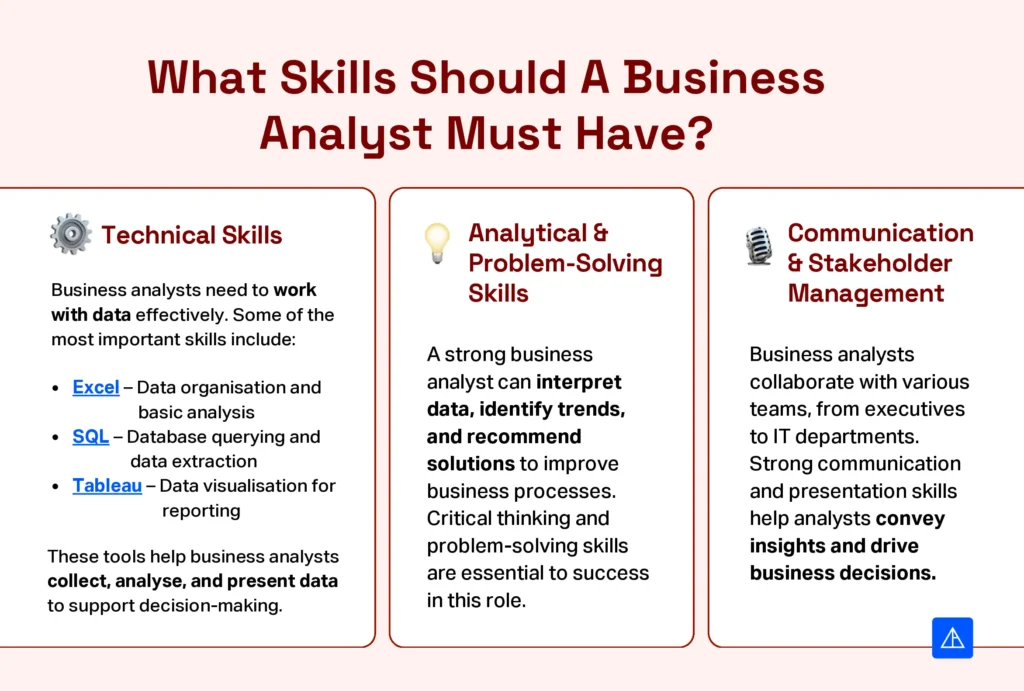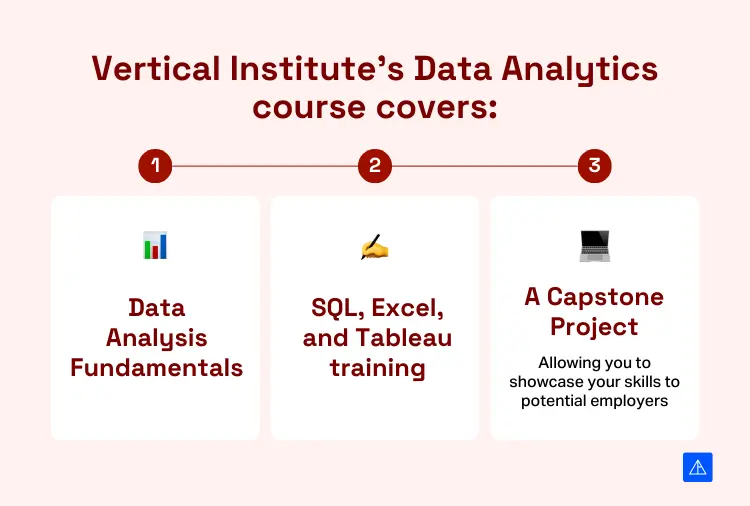A career in business analytics is rewarding and open to professionals from various backgrounds. If you’re looking to switch careers or enhance your skill set, earning a Business Analyst certification can help you break into the field. This article will walk you through the steps to becoming a business analyst, even with no prior experience.
Related Article: Business Analyst vs. Data Analyst: Roles, Skills, and Career Insights
What is Business Analytics?
Business analytics is the process of researching, collecting, and analysing data to solve business challenges. Business analysts play a key role in this process, from gathering data to implementing solutions that drive business success.
Here are its key aspects:
- Data-Driven Decision-Making: Business analysts use data to guide business strategies and operational improvements.
- End-to-End Process: They handle everything from data collection to analysis and solution implementation.
- High Industry Demand: Companies across industries increasingly rely on business analysts to optimise processes and drive efficiency.
- Strong Career Prospects: Business analysts can advance to roles like Senior Business Analyst, Business Analytics Manager, or specialise in areas like financial or IT business analysis. With experience, they can move into leadership positions or transition into consulting, product management, or data science.
- Competitive Salary: The average annual salary for a business analyst in Singapore ranges between S$60,000 and S$76,788, making it a lucrative and stable career option.
Here are the salary insights from various sources:
- Indeed: Reports an average monthly salary of S$6,399, which equates to approximately S$76,788 annually.
- Glassdoor: Estimates an average monthly salary of S$5,000, totalling about S$60,000 per year.
- Talent.com: Indicates an average annual salary of S$72,000 for business analysts in Singapore.
The Future of Business Analysts
According to Michael Amori in a Forbes Technology Council article, business analysts now play an even more strategic role in organisations. The field is evolving due to AI-driven insights, advanced analytics tools, and social listening techniques.
1. AI and Business Analytics
With AI-powered tools, business analysts can extract meaningful patterns from vast datasets, providing deeper insights and making data-backed recommendations with more precision.
GENERATIVE AI QUIZ
Unlock insights into how Generative AI can transform your career.
2. Advanced Data Analytics for Strategic Decisions
Business analysts increasingly use sophisticated analytics software to refine decision-making processes, helping organisations predict trends and optimise operations.
3. Social Listening and Market Trends
Social listening tools enable analysts to monitor consumer sentiment and market shifts in real-time. This allows businesses to adjust their strategies quickly based on live data.
These advancements highlight why upskilling is critical for aspiring business analysts. A Business Analyst certification can help professionals stay competitive by equipping them with the latest tools and techniques in data analysis.
What Skills Must A Business Analyst Have?

1. Technical Skills
Business analysts need to work with data effectively. Some of the most important technical skills include:
- Excel – Data organisation and basic analysis
- SQL – Database querying and data extraction
- Tableau – Data visualisation for reporting
These tools help business analysts collect, analyse, and present data to support decision-making.
2. Analytical and Problem-Solving Skills
A strong business analyst can interpret data, identify trends, and recommend solutions to improve business processes. Critical thinking and problem-solving skills are essential to success in this role.
3. Communication and Stakeholder Management
Business analysts collaborate with various teams, from executives to IT departments. Strong communication and presentation skills help analysts convey insights and drive business decisions.
How to Become a Business Analyst Without Experience
Even if you have no prior experience, you can become a business analyst by following these three steps:
Step 1: Learn the Fundamentals
Start by understanding the basics of business analytics. Read about business analysis concepts, explore case studies, and familiarise yourself with key tools like Excel, SQL, and Tableau.
Step 2: Get Certified
A Business Analyst certification provides structured learning and validates your skills to employers. Certifications from reputable institutions, such as Vertical Institute, equip you with hands-on training in business analytics.
Vertical Institute’s Data Analytics courses cover:

Data Analytics Course
Turn data to practical insights Using SQL, Excel & Tableau.
Advanced Data Analytics
Master advanced Excel, SQL, Tableau with industry experts.
Step 3: Build a Portfolio and Gain Practical Experience
Employers look for practical experience, even if it’s from self-initiated projects. Work on real datasets, complete case studies, and build a portfolio demonstrating your ability to analyse and present business insights.
Frequently Asked Questions About Business Analytics
Do I need a degree to become a business analyst?
No, a degree is not mandatory. Many professionals enter the field through a Business Analyst Certification, hands-on experience, or transferable skills from other careers.
Business analysts are in demand across finance, healthcare, retail, technology, consulting, and government sectors. Any industry that relies on data-driven decision-making benefits from business analysts.
Yes, many business analysts transition from fields like finance, marketing, IT, and project management by learning analytics skills and earning a certification.
Singaporeans and PRs may be eligible for course subsidies and financial aid to reduce learning costs. These subsidies include:
IBF Subsidy – Covers a percentage of the course fee for eligible Singaporeans and PRs.
SkillsFuture Credits (SFC) – Singaporeans aged 25 and above can use SkillsFuture Credits to offset remaining fees.
UTAP (Union Training Assistance Programme) – NTUC members can further reduce costs by claiming up to 50% of the remaining fees.
COURSE SUBSIDY CALCULATOR
Discover how much you can save on Vertical Institute’s courses.
Business analytics skills are valuable across different domains. To enhance your career prospects, you can enrol in:
Data Science – Learn Python and machine learning to perform advanced data analysis.
Digital Marketing – Master marketing analytics and customer insights to make data-driven marketing decisions.
UI/UX Design – Gain skills in user research, prototyping, and data-informed design decisions.
Conclusion
Opportunities in business analytics are expanding, and the proper training can help you transition seamlessly even without prior experience. Take advantage of industry-recognised courses, hands-on learning, and government subsidies to upskill with confidence. Your career as a business analyst begins with a single step—start learning today.
About Vertical Institute
Vertical Institute is shaping the future of work by preparing individuals for tomorrow’s job market. Our courses and certification focus on teaching essential skills and nurturing the next generation of innovators and leaders.
As an Approved Training provider (ATO) accredited by SkillsFuture Singapore (SSG) and the Institute of Banking & Finance Singapore (IBF), our courses adhere to the highest standards. They are government-subsidised and eligible for SkillsFuture Credits or NTUC UTAP Funding.



